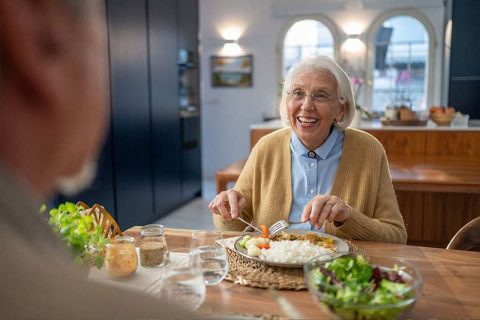June 23, 2025 by

A full plate left untouched can speak volumes. For many older adults, changes in appetite are a quiet signal that something isn’t quite right: physically, emotionally, or both. The loss of appetite in older adults is often a warning sign that deserves attention. Instead of turning mealtime into a battle, learning what might be behind the change can open the door to more effective, compassionate solutions.
Why Appetite Fades
It’s not unusual for older adults to lose interest in food. Medications, changes in taste or smell, dental pain, chronic conditions, depression, and even loneliness can all affect appetite. But while the cause isn’t always obvious, the impact can be serious. Poor nutrition increases the risk of falls, infections, and cognitive decline.
The good news is that a few small adjustments can help turn things around.
Simple Strategies to Encourage Eating
You don’t need to overhaul your entire routine. Sometimes, the most effective solutions are also the simplest:
- Stick to a routine. Regular mealtimes can help the body and mind expect food, even if the person doesn’t feel hungry.
- Serve smaller portions. Large meals can be overwhelming. Smaller, nutrient-dense servings, like soups with added protein or snacks with healthy fats, can go down more easily and still offer needed nourishment.
- Make food easier to eat. If utensils are difficult or unappealing, try finger foods, smoothies, or soft options that require less effort.
- Offer ready-to-eat snacks. Keep easy items on hand like cheese cubes, yogurt, nut butters, or soft fruits. Grazing throughout the day can be more manageable than sitting for full meals.
- Create a pleasant atmosphere. A calm, quiet environment and a little background music can make meals feel more inviting. Eating together can also reduce feelings of isolation, which sometimes causes people to skip meals altogether.
- Give choices. Offering two or three simple options can make someone feel more in control and more interested in eating.
Healthy Eating Goes Beyond Nutrition
Helping someone eat well is about more than meeting calorie goals. It’s about comfort, dignity, and connection. A shared snack, a favorite drink, or just sitting side by side at the table can offer emotional nourishment too.
When It’s Time to Ask for Help
If nothing seems to work and the person continues to eat very little, it might be time to bring in support. Our caregivers can help with shopping, cooking, and mealtime companionship, while also noticing subtle changes in eating habits or health that you might be missing.
With At Home Independent Living, we offer personalized in-home care services in Syracuse, Camillus, Clay, and throughout Central New York to help ensure every mealtime is safe, supportive, and as enjoyable as possible. Call us at (315) 579-HOME (4663) to learn how we can support the nutrition and well-being of someone you care about.
